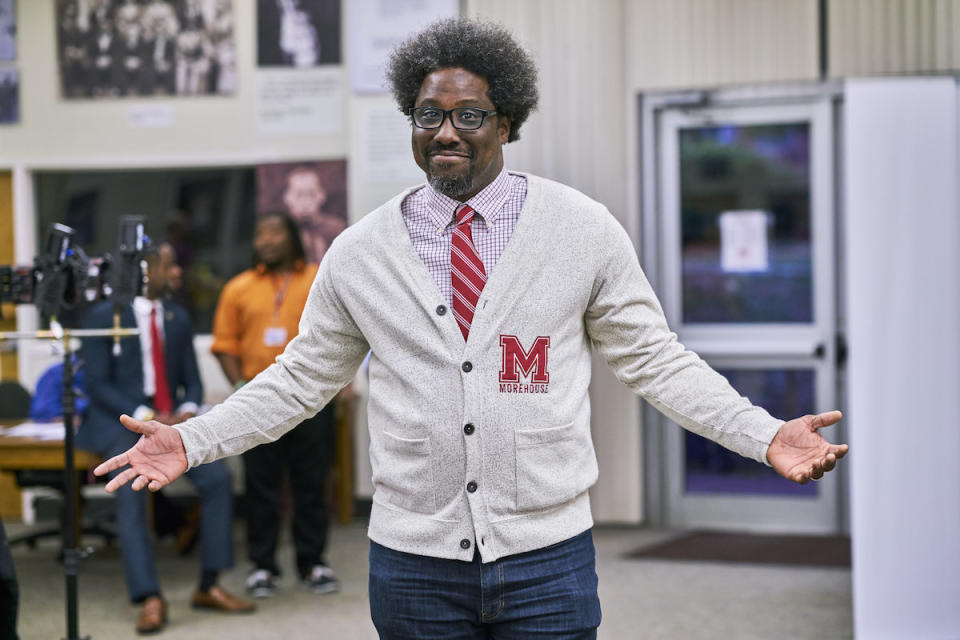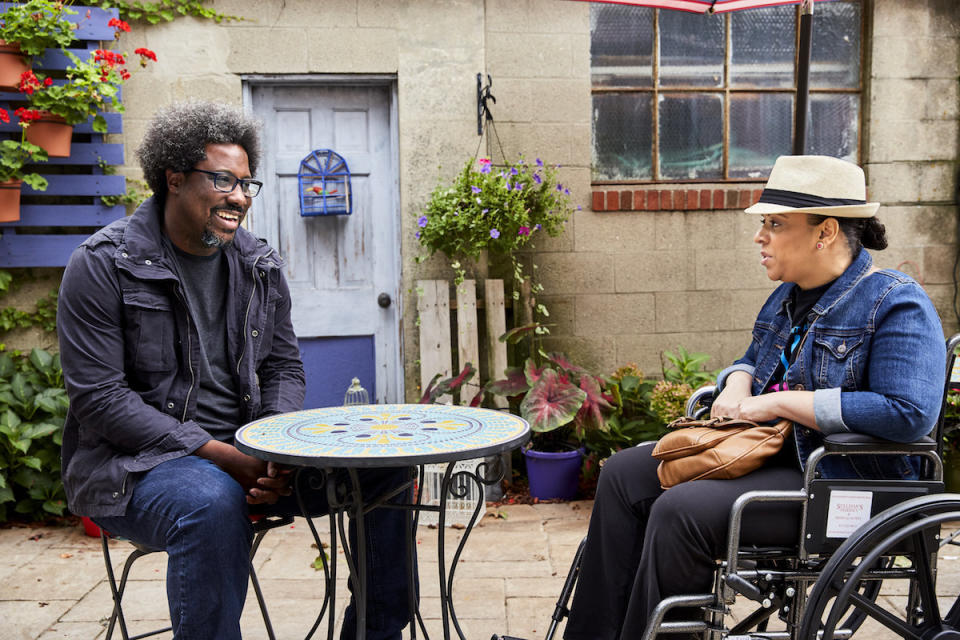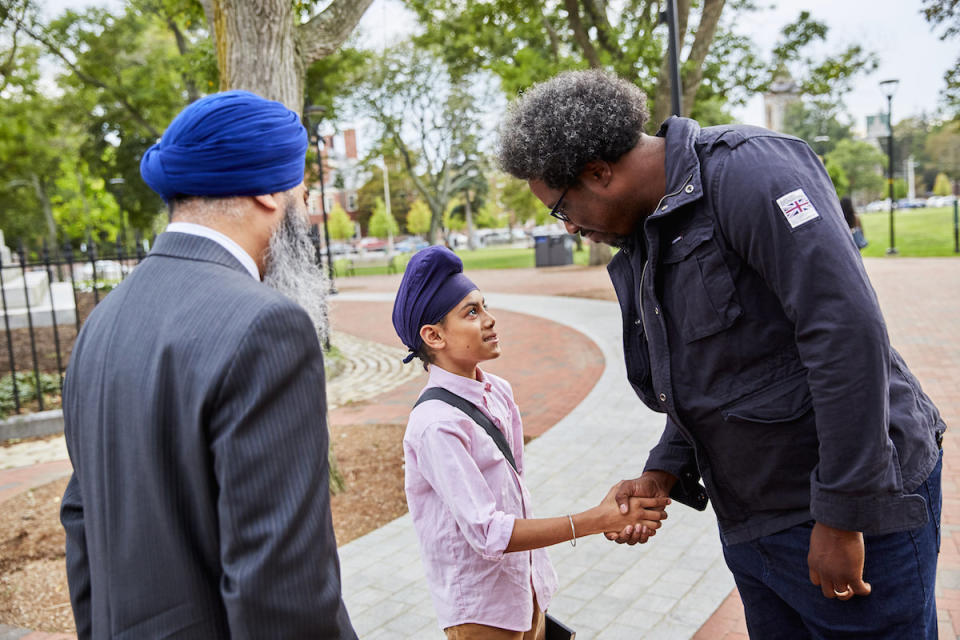W. Kamau Bell Talks Waiting While Black And Comedy 'When Things Feel Hard And Heavy'

W. Kamau Bell’s “United Shades of America” premiered in April 2016, in the full thrust of what was arguably the most contentious presidential election in modern history.
Bell spent the bulk of his show’s inaugural season examining America’s culture clashes, but there’s an endearing inconclusiveness about its episodes. He interviewed members of the Ku Klux Klan, detailed the scourge of mass incarceration, and assessed the wave of anti-Latino sentiment preceding the presidential election. But at the time, viewers weren’t watching with the certainty that many of Bell’s antagonists would ― in a few months ― be emboldened by the highest office in the land.
And so, the forthcoming third season of “United Shades,” like its second, makes certain to grapple with the realities of America under Donald Trump.
Season 2, which earned an Emmy in 2017 for Best Unstructured Reality Program, identified central characters and themes of this new political era. There was, for example, Bell’s hotly debated discussion with avowed white nationalist Richard Spencer, a reflection on Hurricane Irma and the Americans neglected after its devastating tear through Puerto Rico, and a visit to the oft-demonized city of Chicago, a frequent target of Trump’s scathing rhetoric.
The “United Shades” of 2018, though, wrestles much more vigorously with post-Trump America, while taking the pulse of its varied identities just over a year into the Trump presidency. It is both hilarious and tinged with the sobering reality that this world, in which Bell discusses harrowing border crossings and the persecution of Sikhs ― is our world, wrought by our hands.
Bell talked with HuffPost about the upcoming premiere of “United Shades,” waiting for coffee while black and the challenges of political comedy.
We always talk about needs for “discussions” about race, and you’ve been essentially living in that discussion over the past 10 years, through your stand-up and television projects. After all this time, do you ever feel that mere discussion is futile?
I think the thing that I’ve learned recently is that when you focus too much on the discussion, you’re not focused enough on action. Discussion only means something if it leads you to action.
So for example, Starbucks is gonna take a day, close a bunch of their stores, and host a workshop about race, racism, and implicit bias. I don’t know what they’re gonna do — they haven’t released their plans — but that only means something if there’s an action plan in place at the end of the day, if they actually hold themselves to those action items, and if they accomplish real, concrete goals that let the world say, “Yeah, that’s much better now.”
I think a lot of time, I probably talk too much about “discussions,” but I think discussion only means something if it leads to real, quantifiable changes. We have to get out of this town hall thing, like “Well, we all got together and talked for an hour and now we feel better because we sang ‘Kumbaya.’”

Since you mentioned the Starbucks thing, what’s the response been to your CNN piece detailing your own similar experience? I’ve read a couple responses written by people who’ve taken umbrage with the connection you made between your experience getting kicked out of a coffee shop and those of the two men tossed from a Philadelphia Starbucks.
Well, luckily, I learned years ago not to read the comments on anything I write. (Laughs.) I get enough stuff on Twitter — Twitter is the comment section. But the funny thing about it is that I wrote it because I have experience being kicked out of a coffee shop because of what happened to me in 2015 in Berkeley, California, at the Elmwood Cafe. They told me to leave because they thought I was bothering my wife and our baby.
The situation in Philadelphia was way worse because they were arrested, and I think one of the reasons I didn’t get arrested was because my wife was there, she was white, and her skin gave me, as Paul Mooney says, “the complexion for the protection.”
I think both instances are informative in showing a difference between liberalism and progressivism. Sometimes I wonder whether we use the word “progressive” to describe people who are actually just liberal in relation to Republicans today, which could just mean they don’t like some conservative fiscal policy but are perfectly fine with conservative racial politics. Do you see a difference between liberalism and progressivism?
I think a lot of it is that these labels start to become meaningless if they’re not matched by your deeds in the world. I think the people I’m talking about would probably identify themselves as progressives because, you know, they voted for Bernie Sanders, and they support liberal causes, and they donate to this or that, and whenever they see a black child in the street they tell the child they look cute. (Laughs.)
In that vein, I hear from a lot of young, black people who feel as though racism today is more intractable than they’ve ever experienced because it’s insidious and it appears in places they may not have been trained to expect it. Do you feel that way? Is there any resolution to this, or is racism a problem we’re going to be burdened with until the end of our days?
Well, no. I think we have to go down to get through. We have to get deep into it. There’s a minister in Berkeley — Pastor Michael McBride — and he says, “The only way we get through this is white people realizing that racism affects them, too; it makes their lives worse, too.” We want people who are in the work with us. When I hear people say things are worse now than before, I’m like, “No, we just know more information.”
Think about this Waffle House thing that happened in Alabama, where a woman got wrestled to the ground by the cops. Ten to 15 years ago, we would have heard about that maybe a few months later. Maybe not at all, because it was a thing that happened in a small town, in Saraland, Alabama. And if this had been before cellphones, I guarantee you and I would not know about it right now.

That’s true. Not only are we seeing incidents being nationalized now, but the speed at which they’re being nationalized is unique to our time, as well.
In the cellphone era, we just know more things we wouldn’t have known before, and I’m really glad we know more things, because I think every generation automatically thinks the world is getting better because they’re in it, and I’m glad there’s a generation now who says, “Oh, no, no.”
Whether it’s the kids in Parkland, Florida, who are actively turning themselves from high school students into activists-slash-high school students; or all the young black people in the Black Lives Matter movement and other movements who are actually saying, “Oh, no, we need to engage in the work now. We can’t wait until they give us the world.”
Love HuffPost? Become a founding member of HuffPost Plus today.
You mentioned Paul Mooney earlier, and I wonder whether you ever contrast his style of comedy with yours, considering you both lean heavily into discussions about race. His brand seems to be a little more caustic, whereas the vibe I get from you as you explain racism is a little more genial, and I mean neither pejoratively.
(Laughs.) Mine’s a little bit toothless.
No, no, no! That’s not what I mean at all. I think your style is intended to engage and convince, while Paul’s style seems more intended to mock; and I say that as one who sees value in both approaches.
Yeah, I’ve worked with Paul. I used to go to San Francisco all the time and I used to open for him — maybe two or three times. So I’ve been in a room with Paul and that’s why I’ve learned to respect Paul.
He’s one of the greatest of all time, no doubt.
Yeah, and I kinda think if I’m 70 years old, like he was when I was working with him, and the world hasn’t gotten better, I might be like Paul Mooney one day. (Laughs.)
Sure. That level of forthrightness when it comes to racism is goals.
Yeah, and I think he might also be like, “Alright, I tried to be nice about this…”
(Laughs.) Right, at this point he’s like, “I dun told you in every which way I can…”
Right. But also, I think there’s power to the different ways in which this work is done, so I think there’s room for Paul Mooney, there’s room for me and there’s room for black comics who aren’t deeply interested in these issues at all because they’re trying to be comedians. Like, Kevin Hart is not someone you would say is onstage talking about these issues, but I think the black excellence he’s putting into the world and the fact that he’s actually stating he wants to become a billionaire changes the conversations we have about race.

“United Shades of America” differs from your standup and even your previous show, “Totally Biased,” in that you don’t have a live audience to help you shape the latter part of the show. So if the tone is wrong from the start, you don’t have the ability to change things on the fly. How do you go about building jokes for your show that weave between tragedy and comedy?
I don’t think of comedy being separate from tragedy. I think people who don’t work in comedy or people who see comedy through a very narrow lens ... I don’t see comedy as something only to be used when things are light. I think comedy is especially important when things feel hard and heavy.
So when we’re writing “Shades,” we’re looking for the right joke, and I’m always of the belief that there’s a joke to bridge the gap between the sad parts and the lighter parts. I believe there’s a joke for every situation. So it’s up to me and [writer] Dwayne Kennedy to figure out what the “right” joke is.
It’s interesting to hear that sentiment from you, because on the other end of the political spectrum, you hear opponents of political correctness say similar things: that nothing should be untouchable in comedy. You mentioned there’s a joke for every situation. Is there anything you won’t touch?
Well, I think every comic has a place that they won’t go. Some comics like to pretend, like, “I have a take on everything!” That’s not true. No comic talks about every subject equally, and every comic has their own internal biases. So there are things I won’t talk about, but it’s because I have limits like every comic has limits. I’m not going to make a joke that puts my wife down onstage. Some comics love to do that, but I like to be able to go home at the end of my show.

Would you say there’s anything you’ve learned, having seen this show through its third season?
I got feedback in the first season of the show from one black woman on Twitter who was like, “You’re always making jokes about things black people do, and they’re always stereotypical jokes,” like black people eating a lot of salt with their food. And I was like, well, I do think black people eat a lot of salt, but I get your point: It’s not my job to speak for all black people.
So you internalized that feedback? How has it influenced the show, if at all?
I’ve learned that I can’t speak for all black people through this show. There are times when I can, but I should be more selective about how I do it, and I should do it when it’s meaningful. In the first season, I think I did a lot of that because I was the only person of color on the crew of the show, so I was speaking for black people. I think I got caught up in that as I wrote the show, and the show runner — who was a white guy — was writing a lot of the stuff. Whereas in the second season, we hired more black people and I didn’t feel a pressure to represent everyone all the time.
The third season of “United Shades of America” with W. Kamau Bell premieres on Sunday, April 29.
This article originally appeared on HuffPost.

